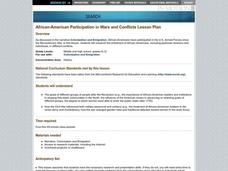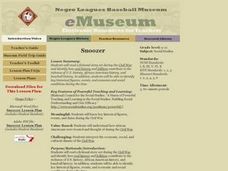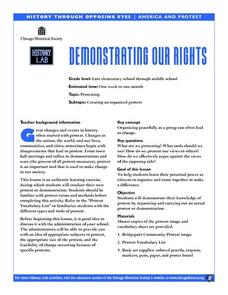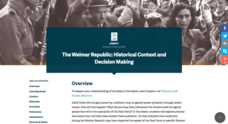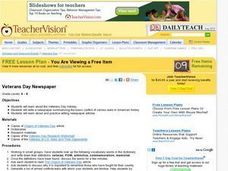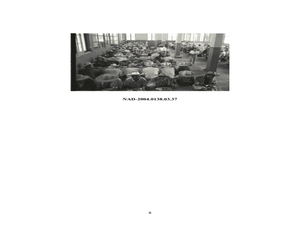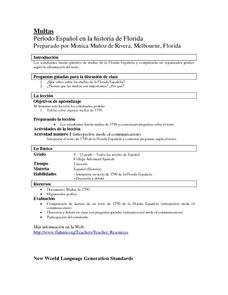Curated OER
African-American Participation in Wars and Conflicts
Students research the enlistment of African Americans, including particular divisions and individuals, in different conflicts. They, in groups, research past American military conflicts, and report on the experience of African Americans...
Curated OER
Snoozer
Students read a fictional story set during the Civil War and identify how oral history and folklore contribute to the richness of U.S. history, African American history, and baseball history.
Curated OER
Abraham Lincoln and the U.S. Constitution
Students investigate President Abraham Lincoln's use of the U.S. Constitution and its importance to the Civil War. In this US history lesson, students read text about President Lincoln and the US Constitution. Students examine the...
Curated OER
This Guilty Land
Young scholars examine the time period just before the start of the Civil War. They focus on John Brown, an activist of the day. After a lecture/demo, students use a worksheet imbedded in this plan to further their understanding of the...
Curated OER
Words In The News
Students are asked to match the civil wars with the main dates they were fought. They work in groups and try to match the vocabulary with the definitions. Students work with other groups to pool their knowledge. They are told that they...
Stanford University
Reconstruction Structured Academic Controversy (SAC)
Young scholars debate whether African Americans were free during Reconstruction. For this debate instructional activity, students use primary documents to support their argument as to whether African American were free during the...
Curated OER
Westward Expansion and the Frontier
Students explore U.S. history by researching a historic map. In this westward expansion lesson, students discuss the mystery of the western U.S. in the early 1800's and the impact expansion had on Native Americans and agriculture....
Curated OER
Reliving History Through Slave Narratives
Students read slave narratives and retell the stories to the class, identifying sensory details. In this slavery lesson, students discuss the importance of sensory details, then read the slave narratives looking for specific examples. ...
Curated OER
Topsy Turvy Kids
Sixth graders study the artwork of Jaune Quick-to-See Smith before creating their own. In this painting lesson, 6th graders examine two pieces of work by Jaune Quick-to-See from the online collection of the Missoula Art Museum and read a...
Curated OER
The Life of Albert Pike
Twelfth graders study the ways Albert Pike affected the history of Arkansas. They discover the many roles that he experienced such as being a teacher, poet, author, lawyer, Freemason and a Civil War General. They work in groups to...
Oklahoma State Department of Education
Narrative Prompt
Reading about history is nothing like experiencing it firsthand. Encourage your eighth graders to do the next best thing with a historical narrative prompt, in which they describe the experience of a first-time traveler on the...
Curated OER
Demonstrating Our Rights
Students view image of Bridgeport Community Protest, discuss event depicted in image, and demonstrate knowledge of protest by organizing and carrying out an actual protest or demonstration.
Facing History and Ourselves
Us and Them: Confronting Labels and Lies
Stereotyping and discrimination based on religion catalyze many atrocities in the world. Explain the awful treatment of Jews and the lies Nazis spread by using an informative yet sensitive resource. Learners participate in a warm-up and...
Curated OER
Before Rosa Parks: Early Grades Activity
Students read excerpts from an autobiographical work and retell scenes from the book. They consider the ways Susie King Taylor's autobiography displays character traits including courage, creativity, compassion and determination.
Curated OER
Before Rosa Parks: Upper Grades Activity: Frances Watkins Harper
Students analyze the rhetorical strategies Frances Watkins Harper used, such as tone, emotional appeal and descriptive language
Curated OER
Veterans Day Newspaper
Students examine the reasons for and origins of the Veterans Day holiday. They define key vocabulary terms, read and discuss the article "The Origins of Veterans Day," conduct research and complete a worksheet, and create a class...
Curated OER
Learning from Photos
Students use photographs to study the Bracero Labor Program. In this analyzing photographs lesson, students are broken up into groups and given a photograph of Bracero laborers. They predict the answers to questions about the photo...
Curated OER
Have Minorities Gained Acceptance
Students cite evidence gathered from magazines about how much Blacks are accepted into the mainstream of American life. They support their conclusions by writing an answer to an essay question.
Eastconn
Learning to Analyze Political Cartoons with Lincoln as a Case Study
Discover the five main elements political cartoonists use—symbolism, captioning and labels, analogy, irony, and exaggeration—to convey their point of view.
Curated OER
Multas
Combine history and Spanish instruction with an exploration of descriptions of fines given in Florida in 1790. Partners read the brief text, fill out a graphic organizer about the crimes described, and interview each other about fines....
Roy Rosenzweig Center for History and New Media
Reward: Valuable Slaves
To gain insight into the American institution of slavery and how African Americans were viewed during this time, groups examine run-away slave ads and slave auction broadsides. Teams use the provided worksheet to record their impressions...
Curated OER
Literature for Lesson 4 - Abolitionists
Students examine the definition of abolition and abolitionists. For this abolition lesson, students complete vocabulary work before reading about Harriet Tubman, Sojourner Truth, and Frederick Douglass. They watch a video about Harriet...
Curated OER
A Song for Every Headline - Lesson 1
Students identify popular songs from 1968 and make connections with the year's current events They recognize popular music as a reflection of the culture. They focus on songs of the Vietnam War era.
Curated OER
CIVICS/CURRENT EVENTS
Young scholars choose to either make an exhibit of posters of pictures about Darfur, or write a letter to the local newspaper regarding Darfur, or plan a concert, party, or bake sale to raise money for refugees. They write a poem...


